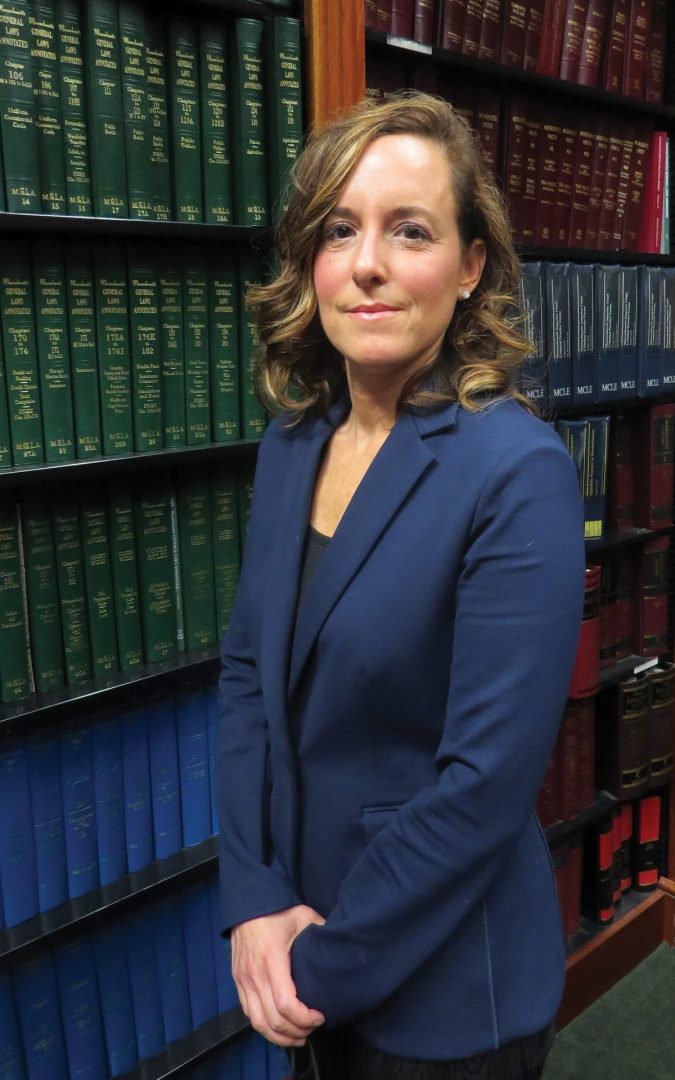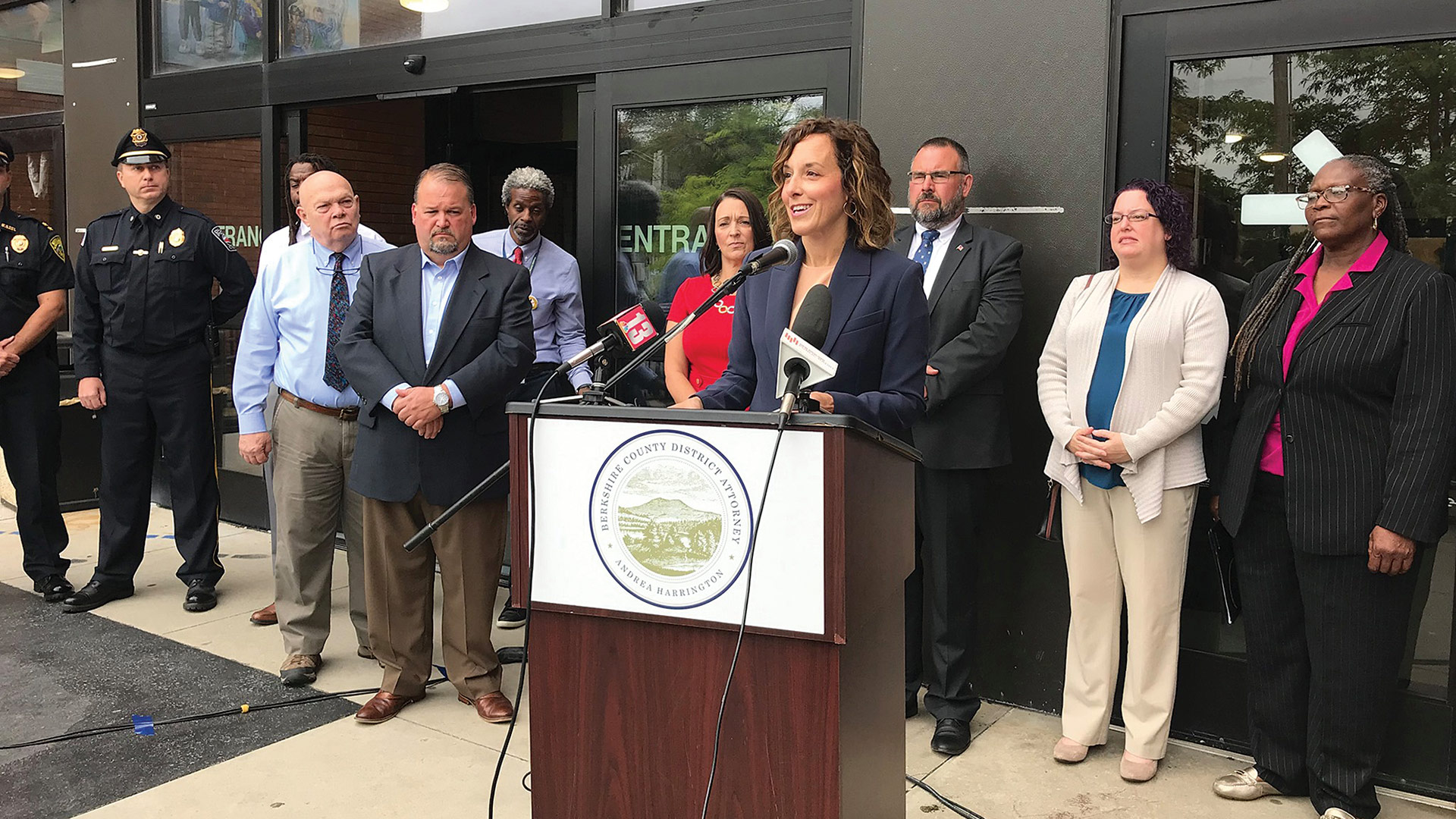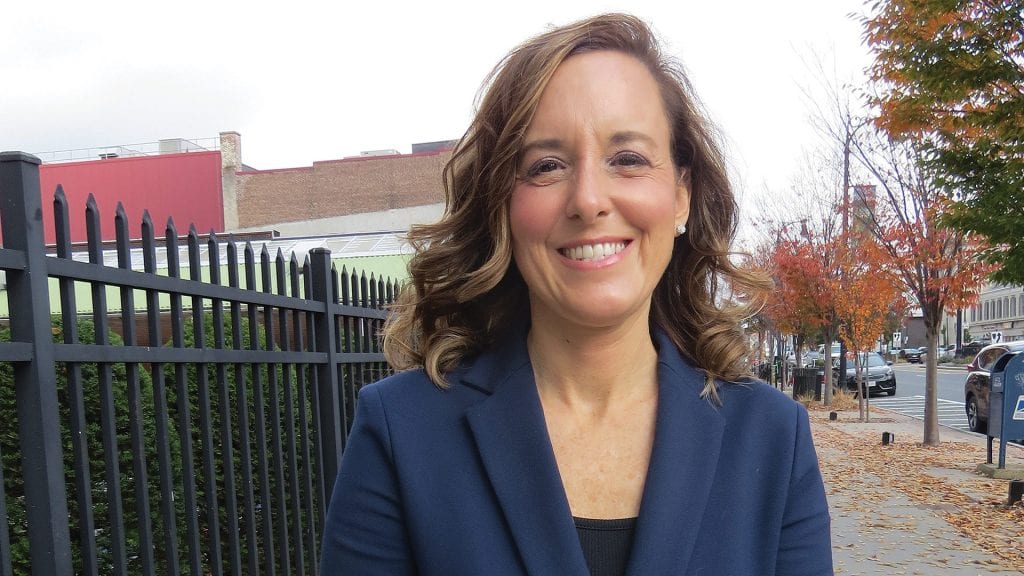Community Spotlight

The Let It Shine! Public Art Partnership, a collaborative effort involving several partners, has helped bring new murals, color, and more vibrancy to downtown Pittsfield.
Rebecca Brien grew up in Berkshire County and has lived in Pittsfield for more than 30 years now. She’s old enough to remember what it was like downtown on Thursday nights after employees at the sprawling General Electric transformer-manufacturing complex picked up their paychecks.
“All of the shops would stay open late,” she recalled. “And all of the employees would get their paychecks and come down to the banks directly to cash them and have dinner and do some shopping. It was definitely a bustling town.”
Brien, who now serves as managing director of Downtown Pittsfield Inc., or DPI — a membership organization consisting of property owners, businesses, residents, and nonprofit agencies — understands that it probably won’t ever be that like again on North Street, the city’s main thoroughfare, and adjacent streets.
But there is a renewed sense of vibrancy — coupled with some stern challenges — in the central business district, she said, noting there are several new and thriving businesses, many of them in the broad realms of arts, tourism, and hospitality, and new initiatives to improve the area and specific storefronts and encourage people of all ages to visit the district and stay for a while.
These include the Let it Shine! Public Art Partnership, a group of Pittsfield-based community members who have come together to organize public art and revitalization on North Street, including several new murals that have brought color to the area and changed the landscape, literally and figuratively, and the Pittsfield Glow Up! Business-improvement grant program, made possible by ARPA funding. The initiative provides grants of up to $10,000 to eligible businesses impacted by COVID to be used for physical improvements that will enhance foot traffic and create visual vibrancy in the district (more on both programs later).
“There’s definitely a concern when it comes to foot traffic, so DPI has been working very hard to make sure that there are activities going on.”
“I do see that our downtown is poised to reach a new potential,” Brien said. “We’re working with MassDevelopment and its Transformative Development Initiative, a program to accelerate economic growth in focused areas, which means we have access to funding and programs that are really making a difference in our downtown.”
Jonathan Butler, president and CEO of the Pittsfield-based economic-development agency 1Berkshire, agreed.
He said Pittsfield and especially its downtown, which has been reshaping and reimagining itself since GE departed nearly 40 years ago, remains a work in progress.
Today, its economy is far more diverse than it was decades ago, when manufacturing was the anchor, he said, adding quickly that manufacturing remains a force, with General Dynamics employing nearly 2,000 people in facilities that were once part of the GE complex.
But the creative economy has also become a huge force in the community, with attractions and institutions such as Berkshire Theatre Group, Barrington Stage Company, and the Colonial Theatre, and this diversity stretches to technology, healthcare, service businesses, and other types of entrepreneurial ventures.

Al Enchill, seen here with his son, Auric, says he’s seen a considerable amount of change and progress in downtown Pittsfield since he first opened his busness.
That list includes Elegant Stitches, an embroidery and screen-printing shop run by Al Enchill and his son, Auric. It specializes in branded custom apparel — from T-shirts to tote bags to umbrellas — and counts a number of area banks and other businesses, colleges, government agencies (including the FBI), and even the U.S. Army in its client portfolio.
Al Enchill first opened his business on First Street in 1997, and has seen a good deal of change and progress downtown since then.
“Pittsfield is changing for the better, and it’s attracting more people,” he said. “I think this will help the businesses here.”
But as much as Pittsfield and its downtown are experiencing growth and progress, there are still considerable challenges, some of them COVID-related.
Indeed, the shift to remote work and hybrid arrangements has left fewer people working downtown, said Butler and Brien, noting that this has certainly impacted many of the hospitality-related businesses in that area. Meanwhile, that same trend has also impacted commercial real estate downtown, Butler added, noting that some businesses are now leasing less space, and others will certainly be tempted to do so.
At the same time, there is a housing crisis — the same one impacting communities across Western Mass., Butler noted, adding that there is potential to convert some of the vacant or underutilized space in the downtown area to housing, something that would address two problems at once and bring people, and vibrancy, to the city center.
For this, the latest installment of its Community Spotlight series, BusinessWest takes an in-depth look at Pittsfield and its downtown, and efforts not to recreate the past, but to create a vibrant, sustainable future.
Progress Report
Brien said DPI, established in 1983, acts much like a chamber of commerce would. The agency serves as a connector and liaison for businesses and property owners, residents, and city officials.
It is currently working on a number of initiatives to bring new businesses and vibrancy to the downtown area, she said. These include a collaborative effort between DPI and the Berkshire Black Economic Council on a VIBE grant that will provide funding for four new businesses to launch in the downtown, a program designed to help fill some of the empty storefronts in the district.
Meanwhile, DPI continues its work with the city and the Pittsfield Economic Revitalization Corp. to administer the Glow Up! grants. A first round of grants totaling $100,000 and involving 12 businesses was awarded in the spring, and applications for a second round of $100,000 opened earlier this month.
“Pittsfield is a commercial center, lots of people physically work in Pittsfield; they all left downtown Pittsfield during the pandemic to work at home, and now, three years later, some of them have returned, but many haven’t. So, like many other downtowns, there’s a large gap in commercial real-estate space, a lot of unfilled space.”
“The money can go toward anything from painting to new windows to new signage and additional lighting,” Brien said, adding that the program’s name explains what business owners are trying to do — glow up their operations.
Overall, there is progress downtown, but several challenges as well, especially when it comes to foot traffic — a concern for most all cities in the post-COVID area. Thus, DPI has intensified its efforts to create programming and undertake initiatives to not only bring people to the area, but extend their stay.
“There definitely have been more challenges, especially for our lunch business in the downtown, especially with the banks, insurance agencies, and organizations like that still working hybrid models,” Brien said. “There’s definitely a concern when it comes to foot traffic, so DPI has been working very hard to make sure that there are activities going on.”
These include an Artswalk on the first Friday of each month between May and December to bring visitors downtown, she noted, adding that the program has been expanded recently to include placing works by local artists in shops and restaurants, as well as music, dance, a marketplace, and activities for children in an effort to extend visitors’ stay in the central business district to include dinner and perhaps a show at one of the venues.
Along these same lines, the Let it Shine! community art project was launched. It includes eight new murals in the downtown and West Side districts.
“These are world-renowned artists — individuals from across the U.S., and local artists as well, who have installed pieces,” Brien said, adding that a digital tour guides individuals to these works and other murals installed in recent years.
“Any night of the week in our downtown, you can find activities, you can find music, shows at the local theaters — we have a great movie theater in our downtown, we have a new brewery that has programming every night of the week,” she went on. “We have great restaurants … there’s a lot to do, and we’re doing what we can to bring people out and take it all in.”
Enchill has witnessed all this out the front window of his business, and he is encouraged by what he now sees. He said that, while COVID took its toll, there are many people on the streets, some of whom will stop into his store to buy a sweatshirt because it’s colder outside than they thought it might be.
“Things are changing here — things are happening,” he said. “Downtown is making its way back.”
‘Fighting Its Way Back’
Butler concurred, and noted that there is a sense of momentum in Pittsfield, visible on many fronts.
These include population growth, something all Berkshires communities have been seeking, especially in the form of professionals fleeing larger municipal centers in the wake of COVID for more rural zip codes that offer quality of life and opportunities to work remotely.
Pittsfield fits that description, Butler said, adding quickly, though, that whatever surge there may have been has crested. Meanwhile, he wondered out loud how many of these new arrivals were simply living in the Berkshires and not working there — and, thus, not providing any relief for a workforce crunch that is still impacting businesses across most all sectors, but especially the tourism and hospitality industry.
“It’s absolutely a tough time workforce-wise; I don’t know if we’re off trend with the rest of Massachusetts or New England, but we’ve definitely felt pressure in the hiring market going all the way back to 2017 and 2018, pre-pandemic, and then it accelerated with the pandemic, and we’re still feeling that,” he said, using ‘we’ to mean the Berkshires in general but especially the region’s largest community, where roughly 40% of those employed in the county work.
“And it’s really every sector, from hospitality to healthcare, manufacturing, and tech; we just have a variety of sectors where they’re hiring everywhere, and it doesn’t appear that the workforce needed for our current employers is seeking employment at the volume needed in the Berkshires.”
The problem is especially acute in the tourism and hospitality sector, Butler said, where some businesses, including hotels and restaurants, have been forced to alter operations, and often hours or days of operation, because of an inability to find enough help.
As for the downtown, he said it is “fighting its way back,” a phrase he used not necessarily in reference to the loss of GE, although that’s part of it, but rather to COVID and its after-effects, with regard to both visitation and a changing workplace that has left at least Mondays, Tuesdays, and Wednesdays quieter than they were before the pandemic.
“Downtown Pittsfield was probably the heaviest pressure point in terms of pandemic-induced economic impact, and that was probably the case with most gateway cities and larger cities,” he said. “And in the case of downtown Pittsfield, I think it was a combination of things — Pittsfield is a commercial center, lots of people physically work in Pittsfield; they all left downtown Pittsfield during the pandemic to work at home, and now, three years later, some of them have returned, but many haven’t. So, like many other downtowns, there’s a large gap in commercial real-estate space, a lot of unfilled space.”
Elaborating, he said some businesses are carrying on in the same space as before the pandemic, but others have changed their footprint to accommodate a smaller on-site workforce, leaving space to be leased.
Space that might be used to help combat the ongoing housing crisis, he said.
“There’s an opportunity to convert a lot of this underutilized space that we found post-pandemic into housing,” Butler explained, adding there are a probably a dozen buildings in and around downtown Pittsfield that could be retrofitted for such use, and a $4.8 billion housing bond bill proposed late last month might help fund such transformations.
Seeing the Light
Brien has obviously seen a great deal of change in downtown Pittsfield from those days when GE dominated the economy and even the culture of the community.
And the pace of change continues, most recently in a positive way, with new businesses and new initiatives that make the city and its downtown a destination.
“I really feel that there’s a glimmer,” she told BusinessWest. “It’s not going to happen overnight, but every day, we do a little bit more to bring Pittsfield and our downtown back to life.”
A life that respects the past, but is more a reflection of the future.










